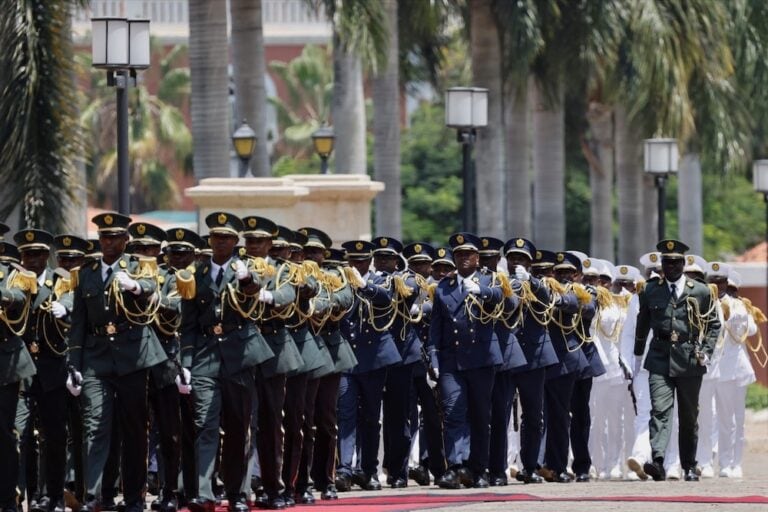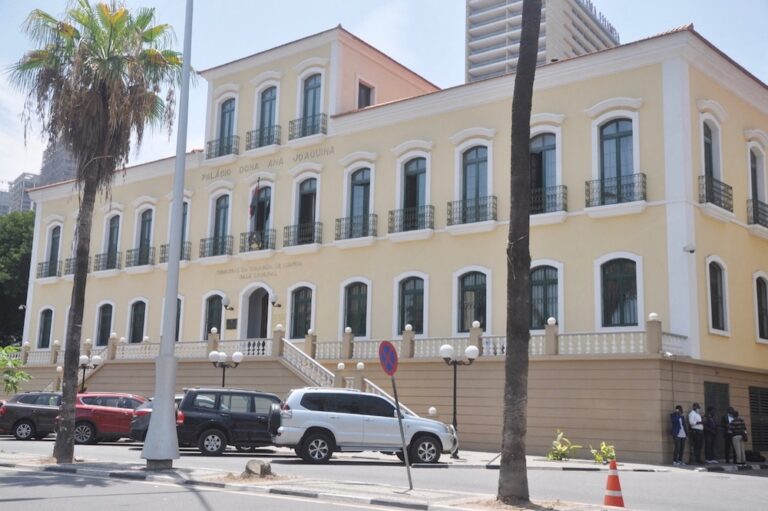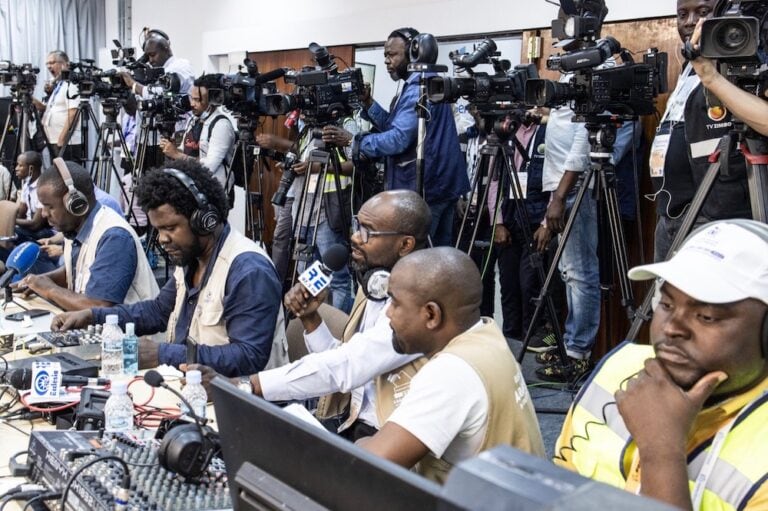(CPJ/IFEX) – CPJ is gravely concerned over the increasing repression of the media in Angola. **Updates IFEX alerts as noted in text** Since late 1998, when the breakdown of the Lusaka Protocol peace accords led to a resumption of the civil war, there has been a marked increase in both the frequency and the seriousness […]
(CPJ/IFEX) – CPJ is gravely concerned over the increasing repression of the
media in Angola.
**Updates IFEX alerts as noted in text**
Since late 1998, when the breakdown of the Lusaka Protocol peace accords led
to a resumption of the civil war, there has been a marked increase in both
the frequency and the seriousness of reported attacks on the media in
Angola. But since 1997, when the government stripped the Supreme Court of
powers to deal with constitutional matters, journalists have had no judicial
recourse for the protection of their fundamental rights.
CPJ is aware that in June 1999, an agreement in principle was reached
between the Angolan government and the United Nations on a downsized UN
mission in the country, although the precise mandate of the future human
rights component has not yet been confirmed. CPJ is also aware that the
office of the UN High Commissioner for Human Rights in Angola, working
through the Human Rights Division (HRD), is interested in supporting Angolan
initiatives to build the capacity of the government and civil society to
promote and protect human rights – in particular to strengthen the rule of
law.
Since the beginning of 1999, the Angolan authorities have repeatedly warned
of a
crackdown against journalists who are “unpatriotic” or allegedly “inciting
treason.” In that time, CPJ has documented the following cases of attacks on
the press:
On 11 January, Angolan authorities arrested Jose Manuel Alberto and Jose
Cabral Sande, journalists from the commercial FM Radio Morena, in Benguela
province. The arrests came shortly after the radio station had re-broadcast
a news program from Radio Televisao Portuguesa (RTP), featuring an interview
with an official of the Union for the Total Independence of Angola (UNITA).
The two journalists were held at a local police station on charges of
“disobedience and offences against the head of state,” but were
unconditionally released one day later because of insufficient evidence (see
IFEX alert of 21 January 1999).
On 1 March, the Ministry of Social Communication announced that reporting on
draft evasion would be considered a criminal act, and that journalists who
did so would “face the sanction of the law, including, among others, the
cancellation of the license to publish and withdrawal of the license to
broadcast” (see IFEX alert of 30 April 1999).
On 29 April, CPJ conveyed its concern to the President of Angola, His
Excellency Jose Eduardo dos Santos, over the 28 April attack on journalist
Josefa Lamberga, a reporter for the Luanda bureau of the Voice of America
(VOA). Lamberga was assaulted by a corporal of the Angolan army in
connection with her reporting on draft evasion (see IFEX alerts of 30 April
1999).
On 9 June, CPJ again wrote to the President of Angola, expressing alarm at
the comments made by the Minister of Social Communication, Hendrik Vaal
Neto, in an interview carried on state radio on 1 June. In that interview,
Neto threatened to shut down the independent press in Angola if it did not
support the government’s war effort against Jonas Savimbi’s UNITA rebel
movement (see IFEX alerts of 10 and 8 June 1999).
In that same letter, CPJ also protested against the harassment of William
Tonet, editor of the independent newspaper “Folha 8”. On 3 April, Tonet was
interrogated for several hours at the Criminal Investigation Department in
Luanda. The military attorney’s office had earlier alleged that certain
articles published in Tonet’s newspaper were inciting young men to evade
military duty, and that they were insulting to the Angolan government. An
investigating officer apparently pressured Tonet to reveal his sources, and
accused him of jeopardizing state security (see IFEX alerts of 10 June, 22
April and 19 April 1999). To date, CPJ has not received a reply to these
letters.
Reports later emerged that in May 1999 alone, at least three journalists
were assaulted in Angola. On 5 May, Joaquim Alves, a journalist with the
weekly newspaper “Actual Fax”, was attacked and beaten by three armed men,
one of whom was said to be in military uniform, who accused him of having
written a story in which a prominent businessman was referred to as a
sympathizer of Jonas Savimibi. On 13 May, Lara Pawson, the Luanda-based
correspondent for the BBC and the Reuters news agency, was assaulted by a
group of men outside a restaurant in the city, apparently in connection with
reports detailing allegations that the government was diverting civilian
food aid to its own soldiers. That same month, freelance journalist Machado
Irmao was attacked and beaten by a group of people alleged to have been
wearing police uniforms, also in connection with reports that were perceived
to be critical of the government. Between April and July, there have been
numerous other reports of journalists in Angola threatened or harassed
because of their work (see IFEX alert of 7 July 1999).
Recommended Action
Send appeals to the UN High Commissioner for Human Rights:
respect
for press freedom in Angola, thereby enabling journalists to fulfill their
right to practice their profession without fear of reprisal
Court
in Angola, that would provide due recourse for journalists whose
constitutional rights are violated
impart information and ideas of all kinds, as guaranteed by Article 19 of
the Universal Declaration of Human Rights, Article 19 of the International
Covenant on Civil and Political Rights, and Article 9 of the African Charter
of Human and People’s Rights, to all of which the Republic of Angola is a
signatory
position
would also constitute a grave violation of these freedoms
Angola
priority to improving press freedom guarantees while the modalities of the
future UN presence in Angola are being finalized
Appeals To
Mary Robinson
United Nations High Commissioner for Human Rights
Palais des Nations
CH-1211 Geneva 10
Fax: +41 22 917 9012
Please copy appeals to the source if possible.


